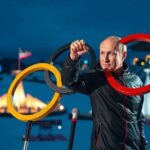Concerns Rise as Trump Pushes for Direct Talks with Russia Over Ukraine Conflict
President Zelenskyy of Ukraine advocates for an “armed forces of Europe” amid concerns of being sidelined as President Trump initiates direct negotiations with Russia. Trump’s shift in U.S. policy toward Ukraine has alarmed European allies, prompting debates regarding their inclusion in discussions aimed at resolving the ongoing conflict. Amidst this backdrop, European leaders are urged to unify and recalibrate their strategies in light of evolving U.S.-Russia relations.
In recent developments, Ukrainian President Volodymyr Zelenskyy has proposed the establishment of an “armed forces of Europe” to solidify Ukraine’s fight against Russian aggression, indicating that a strong foundation for such a force exists. As the conflict continues, Zelenskyy underscored the need for “security guarantees” from the United States prior to entering discussions aimed at ending the war.
President Donald Trump has altered U.S. policy towards Ukraine, expressing his intent to embark on negotiations with Russian President Vladimir Putin to conclude the war. The administration’s shift has raised concerns among European allies and Ukrainian officials about being excluded from these critical discussions.
Trump’s administration dispatched key officials, including Secretary of State Marco Rubio and national security adviser Mike Waltz, to Saudi Arabia for upcoming negotiations. While it remains uncertain how many Ukrainian or European representatives will participate in these talks, adjustments to who will be involved could occur as discussions progress.
President Trump has stated that President Zelenskyy will be involved in the negotiations, although he did not provide specific details. This has been met with skepticism from European capitals regarding the willingness of the new U.S. administration to involve them sufficiently in the negotiation process.
Zelenskyy articulated a shift in how relations between Europe and the United States will be managed moving forward, suggesting an adaptation of existing frameworks to cater to new dynamics. Meanwhile, White House representatives have countered the notion of European exclusion, asserting that consultations with European leaders are ongoing.
Trump’s recent communications with foreign leaders, including French President Emmanuel Macron and British Prime Minister Keir Starmer, suggest an intention to maintain engagement with key European partners while advancing direct talks with Russia. Administration officials insist that the European partners are indeed part of the ongoing discussions.
Despite reassurances, significant apprehension lingers in Europe about Trump’s rapid approach to negotiations with Moscow, particularly as a Ukrainian delegation prepares for continued discussions in Saudi Arabia. Concerns have been raised about America’s motive in garnering access to Ukraine’s rare earth deposits in return for military assistance.
Ultimately, these developments highlight rising tensions and the need for a cohesive response among European nations, leading to a scheduled emergency meeting in Paris. French officials have emphasized the importance of unity among European countries in the face of the changing geopolitical landscape created by U.S. actions.
The shifting U.S. stance on negotiations with Russia regarding the Ukraine conflict has generated unease among European allies and Ukrainian officials. President Trump’s approach, characterized by direct talks with Moscow, raises concerns about the potential exclusion of critical European input. As diplomatic efforts advance, the necessity for coordinated responses among European states becomes increasingly vital, culminating in urgent discussions to redefine relations and strategize effectively in response to the changing dynamics.
Original Source: apnews.com








Post Comment